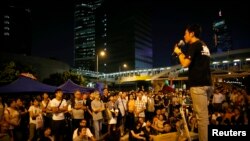Hong Kong’s two-week-old democracy protests swelled Friday after the government called off talks with protest leaders and thousands joined what had been a dwindling occupation of a central city district.
The largest demonstrations that the Asian financial hub has seen since unifying with China erupted last month over Beijing’s decision to screen candidates for the territory's 2017 election.
The unrest has worried Beijing, which has allowed Hong Kong a degree of autonomy not seen anywhere else in China and which fears unrest could spread.
Protesters, led mainly by university students, have jammed the city’s Admiralty district, where many government offices are located, in an effort to reform the city’s constitution and push Chief Executive Leung Chun-ying to resign. Protesters also accuse police of using excessive force on the first day of the actions.
Protest leaders and government representatives met Thursday for talks, but the Beijing-friendly government was angered by student leaders' threats to escalate protests if their demands weren’t met. Authorities also said negotiations scheduled for Friday could not be held while the protests continue.
“We're just showing that if you don't talk, if you don't have a real conversation with the representatives of the students, with everyone in Hong Kong, we're not going to stop,” said Clara Thang, a student who’s been protesting for five days. “We're not just going to go home and sleep. No. Never.”
Alex Chow, of the Hong Kong Federation of Students, said the government was stalling, and said students hadn’t done anything to provoke the breakdown in talks. He also ridiculed the government's decision.
"Hong Kong is an international metropolitan city. This move by the government, this response by the government, is absolutely an international laughing stock,” Chow said.
Earlier, Hong Kong Chief Secretary Carrie Lam told reporters that the protesters' call for an expansion of demonstrations made talks impossible.
"We cannot accept the fact that someone will link the talks with possible continued illegal [protests]," Lam said.
The rally Friday evening was smaller than earlier days, when tens of thousands flooded the districts. Supporters had been incensed when police used tear gas and pepper spray to try and control the crowds.
Exam Prep
In one section of the demonstrations, volunteers used leftover wood planks to build tables and chairs for a makeshift study center in the middle of the blocked-off road, helping students who have boycotted classes but will soon take exams.
“It seems like a classroom, so it's quite comfy,” said Angela Chan, who sat next to a few fellow students under faint lights studying history.
“First they learn about what is real democracy,” one volunteer teacher, who did not want his name used, told VOA as he tutored a young girl. “But, at the same time they can't give up what they learn in the school normally because this actually having them grow up in their mind. So, I just come here to help them finish the work that they can't do in the school.”
Beijing’s Concern
Officials in Beijing have watched the demonstrations with growing concern, worried that unrest could spread to the mainland and challenge the Communist Party’s singular control of the country.
Speaking in Berlin while meeting with German officials Friday, Chinese Premier Li Keqiang said he was confident Hong Kong's social stability can be preserved. He also said China would not change its so-called "one country, two systems" arrangement, which has given Hong Kong its special status within China.
German Chancellor Angela Merkel, meanwhile, called for freedom of speech to be preserved in Hong Kong and said she hoped for a peaceful resolution to the tensions.
Some protesters have been emboldened by recent media reports that Leung took $6.4 million in undisclosed payments from an Australian company while in office.
Leung has admitted the payments but denied wrongdoing, saying the deal was a standard non-compete clause signed before he became chief executive.
Congressional Support
In Washington, a U.S. congressional panel criticized Beijing’s actions, and suggested that the U.S. government resume regular monitoring of Hong Kong, a semiautonomous territory.
In a report released Thursday, the Congressional-Executive Commission on China said Beijing's actions "raise concerns about the future of the fragile freedoms and rule of law that distinguish Hong Kong from mainland China."
Hong Lei, a spokesman for China’s foreign ministry, warned U.S. lawmakers to stop sending the "wrong message" to the protesters.
"The report by this U.S. body distorts facts and is a deliberate attack on China. We express our extreme dissatisfaction about it," Hong said. “We demand that this committee stop this wrong interference in and damaging of Sino-U.S. relations.”
U.S. Sen. Sherrod Brown, who unveiled the report, called on President Barack Obama to press his Chinese counterpart Xi Jinping on Hong Kong and other issues when the two meet next month in Beijing.
A 1992 law obligated the U.S. State Department to conduct annual briefings to Congress on Hong Kong and China’s obligations under international treaties. That stopped in 2000, three years after Britain returned Hong Kong to China.
The White House has avoided expressing outright support for the protesters, but has said it supports universal suffrage in Hong Kong. China condemned those remarks as interference in its internal affairs.
Some information in this report was provided by AP, AFP and Reuters.




